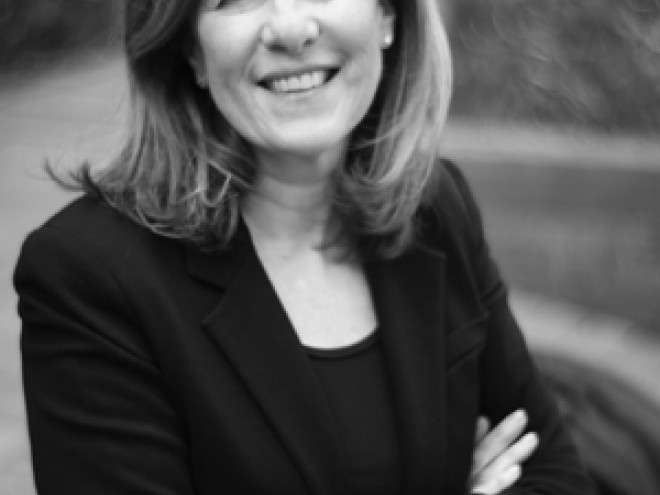
Debbie Bornstein Holinstat is the co-author of Survivors Club, an account of her father’s early childhood at Auschwitz. Debbie is guest blogging for the Jewish Book Council all week as part of the Visiting Scribe series here on The ProsenPeople.
You know you’ve moved to a town where you’re in the minority when even the handful of Jewish people you meet are surprised you’re Jewish — after you’ve introduced yourself with the last name Bornstein. In Ottumwa, Iowa, there aren’t even enough Jews for anyone to recognize patterns in last names. I lived in that small Iowa hamlet for one year of my life, reporting for the local ABC affiliate; my first job out of college. I was there to hone my journalism chops, but I ended up learning just as much about Judaism and the need for connection as I did about information gathering and linear edits.
The biggest lesson came on Yom Kippur, in a moment that left me horrified and saddened, but it also woke me up.
A soft-voiced, aged Rabbi welcomed about ten congregants and me. I had hoped to return home for the holiday but my work schedule didn’t jive with the flight schedule so here I was, entering Ottumwa’s modest synagogue for the first time. “We see you on TV every morning! You’re Jewish? Really?” I signed off every news report with my name, first and last. I was floored no one guessed that a “Debbie Bornstein” was Jewish. The group was mostly seniors, their children all grown, and I was touched that they invited me to a break-fast dinner at one congregant’s home later that evening.
The morning service was longer than I’m accustomed to, but lovely. When it ended everyone filed out to their cars in the desolate parking lot. I noticed that one woman stayed back. She was sitting alone in a bench and seemed to be settling in with a book. “Do you need a ride?” I asked. She told me she stayed until mincha, the afternoon service. “That’s silly!” I said. “I’ll bring you home and pick you back up for mincha. There’s no reason to sit here all day.”
The woman, whose name I can’t remember but whose story I’ll never forget, told me that every year, on the High Holidays, her husband drops her off at the synagogue very early. Then he picks her up after sundown. He didn’t want anyone to know that she was Jewish. It embarrassed him. Even this woman’s own children didn’t know she was Jewish — or that they are Jewish, too.
I thought about opening my mouth. I thought about telling her to march proudly out of the synagogue in broad daylight, to tell her husband she’s never going to hide her religion, to call her kids and tell them they are among God’s “Chosen People”. Oh, I had plenty of thoughts running through my meddlesome mind. But I didn’t say a word. My face might have spoken for me, but my lips were zipped. At the age of 22, I didn’t feel it was my place to interfere in a person’s private family dynamic. I just sat with her a while instead. After some time, it was clear she was enjoying her book and her silence so I shuffled home, stomach growling, mind swirling.
I’d like to tell you that the woman I left behind at synagogue that fall of 1996 was reading Midrash or Talmudic analysis or even Judaism for Dummies. I think it might have been a Danielle Steele novel. My takeaway remains the same though. There are people living right here in this diverse country who still have obstacles connecting to Jewish life. Few things can change that in a town where there are more eggs in a carton, than there are Jews at High Holiday services.
But Jewish books can fix that. If someone never has the opportunity to learn how to prepare a proper Passover Seder, she can learn about it in books. If an elderly man fears that no one in his community will know to arrange shiva, the Jewish mourning ritual, when he passes, he can learn more about the significance of shiva and share it with friends — through books. Jewish philosophy on life and love, parenting and passing are all available these days with a swipe of a button on mobile phones or a quick stop at the bookstore, and if someone has never had the opportunity to hear firsthand accounts of the Holocaust from a living survivor, they can still read their stories.
I am immensely proud to know that someone in Ottumwa, Iowa, or a town like it, may now be able to pick up Survivors Club andlearn about the atrocities of Auschwitz from my dad’s story, and about the faith that endured from Auschwitz to America. There is infinite value in Jewish connection, and if we have written a book that adds one more link, then I am a happy former Ottumwa resident.
Debbie Bornstein Holinstat is Survivor’s Club co-author Michael Holinstat’s third of four children. A producer for NBC and MSNBC News, she lives in North Caldwell, New Jersey. She also visits schools with her father, and has been working with him for two years, helping him research and write his memoir, although she has grown up hearing many of these stories her entire life.



